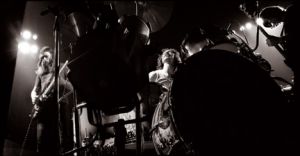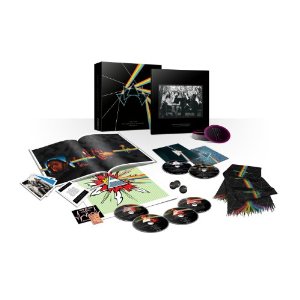An Extended Conversation with Pink Floyd’s Nick Mason

C Jill Furmanovsky-rockarchive.com
If Nick Mason had his way, he’d unpack his drums today and head back out on the road with his former surviving Pink Floyd bandmates, bassist/songwriter/vocalist Roger Waters and guitarist/vocalist David Gilmour. That’s not going to happen, but deep-pocketed Pink Floyd fans can console themselves instead with lavishly produced boxed editions of three of the band’s classic albums – The Dark Side of the Moon, Wish You Were Here and The Wall – which EMI Records, the band’s label since the beginning, recently released as the Immersion series. Each set includes not only the remastered original album, but also tons of rare and previously unreleased material, stunning video (on DVD and Blu-Ray) and printed material, assorted collectible knick-knacks and more.
Pink Floyd held out for years on releasing reissues and compilations. Now you’ve decided to put out these enormous packages. What changed?
Two things. One was having it explained to us. This was very much generated by EMI. They’d done a whole bunch of stuff with the Beatles and then they made a presentation to us of what they thought we should do. We realized that perhaps because it had been such a long time, it actually might be interesting and the fans might actually like the detail on how we did things. In the past the theory had always been that you just released the album, as perfect as you can make it, in its final form. I have a big collection of jazz records with a lot of outtakes and it does increase the interest. So I think we basically understood that there was some good reason to do this.
Were you surprised to find out how much material was in the EMI vaults?
Yes, I was. But the trouble is that once you start doing it, you’re short of material. Because it was never thought about, what you get is an enormous amount of material for one song or for one period, and then you’re really short of stuff for other elements of it.
What was the best find?
That’s an easy one; it’s the Stéphane Grappelli violin part [on “Wish You Were Here” ]. I can’t remember anything quite as special as that. It would have been great to have, say, seven other guitar solos that Dave [Gilmour] out on “Comfortably Numb” before going with the one that we went with.
Who brought Stéphane Grappelli in?
We didn’t. He just sort of wandered in anyway. He was working with [violinist] Yehudi [Menuhin] down the corridor. At Abbey Road [Studio in London] if someone is in one studio they might come in and say hi to someone in another. What I remember about it is the ease with which Stéphane sort of wandered into the studio and knocked it out
How involved were you and the other members of Pink Floyd in the planning of this project?
We’re all involved. Nothing is ever passed by one person. All of us really like physical records. I certainly haven’t grown out of them yet. But I do see the future as being rather different in terms of added value when you buy music. The thing that someone showed me, which I was really impressed by, was the Björk downloading material. There will be fantastic stuff that you’ll be able to download with music that will give it value and bring it back to being more like an old-fashioned CD.
Who do you see as the audience for these, mostly baby boomers who grew up with the band?
Absolutely for the Immersion versions. It’s people who know the music already and would like to engage at another level, particularly with The Wall, where you can track one song from the original Roger demos through the band demos to the actual recording to the live playing. It’s not what I’d recommend to a beginner. Obviously what we’d like to do is bring in a younger listener, to have relevance to kids. That’s gratifying. There is some longevity to the music. It’s important to remember that rock music comes in all different forms. It can be two-minute pop records or 25-minute meandering or whatever.

Dark Side of the Moon Immersion Box
It’s almost radical for you to be putting out these huge physical packages in this era of downloading and streaming.
It’s probably the last gasp at that sort of stuff. I really like it and I think it’s important to do it now, rather than wait until no one wants it. The problem is we’re all living in this different world where property becomes more expensive, particularly for the age group that music is important to. Storage becomes more of a problem. People my age have got huge collections of vinyl and CDs. My kids don’t have room for it, let alone interest in it.
Why did you choose Dark Side of the Moon, Wish You Were Here and The Wall for this special treatment? Is it strictly because these were the best-selling Pink Floyd records?
To put it bluntly, that’s exactly right. But having said that, the idea was always that if people liked it, we could continue. I would love to get started on an early Pink Floyd Immersion, although we’re very short on music. We don’t have much in the way of demos. We do have some demos that we recorded before we had a record contract, and we have some tracks from around A Saucerful of Secrets that have been bootlegged but never put on records. We can do much nicer versions of those.
How much Syd Barrett-era material is still out there and will you release whatever remains in the vault?
There are some things. Those demos that I mentioned are original songs of Syd’s, plus a couple of covers. As far as I know they haven’t as yet been bootlegged. That’s something for the Syd people. I don’t have a problem with that. Syd Barrett Pink Floyd is very special; it was the launch pad of everything else we ever did. If people are stuck in that particular loop, that’s fine by me. I respect that.
Does the early Floyd hold up for you musically?
Yeah it does. One thing is that [Syd] was a wonderfully gifted songwriter and also, there are a lot of germs of ideas that came up later, Rick’s playing [Richard Wright, the band’s late keyboardist] in particular. Tracks like “Interstellar Overdrive” have that whole thing about finding ideas and pushing them around, even in the recording studio.
Was it important to you as a drummer to understand what Roger, or Syd before that, were writing about?
No, to tell you the truth. The lyric content is low on my list of things I need to work out. What I listen to initially is whether a song sounds good. If it’s something that grates lyrically, you might take issue with it. I really like the lyrics for “Set the Controls for the Heart of the Sun” but they’re secondary to the actual feel of the music.
Hypothetical question: If Syd had stayed with the band, do you think it would have become as massive?
I think there’s a chance it would have, because Roger would never have stood in the background and allowed him to be the only writer. It’s a complete imponderable, really. We probably would never have had that really useful thing, which is the great guitar virtuoso [Gilmour], which would have perhaps been a restraint. Maybe Syd would have become that.
Roger Waters, David Gilmour and Nick Mason during “Outside The Wall” finale at Waters’ The Wall Live show at the O2 Arena in London on May 12, 2011.How would you characterize your relationship with Roger and David today?
I get on with both of them. But that doesn’t necessarily mean that they want to go back on the road as Pink Floyd. I think David, particularly, is not enthusiastic at all to return to that scale of operation.
What about you?
Oh, I’m ready to go. But it’s easier for me. I don’t have some of the creative issues that the other two do. It’s a bit more difficult without Rick there as well. The trouble is if we did it, we’d have to do it properly, and that would be very difficult at this stage, to go out for a year and play old material. I cannot see us going back in the studio.
Were you surprised when Pink Floyd first broke in America?
Well, I suppose a little bit surprised just because we’d been struggling for five years without breaking. We had good audiences but we couldn’t seem to go beyond that. In hindsight I’m not the least bit surprised because suddenly, after five years, we had Bhaskar Menon as president of Capitol Records, and he decided to make it work. You can’t make it work unless you’ve got the record company.
How do you feel about Roger touring with his own production of The Wall ?
It’s fine. To be honest, I think it’s great. That was always his baby and it’s bringing him the recognition he failed to get after he left the band. It’s well deserved and he should enjoy every minute of it. I think the show is fantastic. What he’s done with film and bringing a 30-year-old show up to date is sensational. He’s being incredibly faithful to the original music.
You did a project in the early ‘80s called Fictitious Sports, which included several jazz players like Carla Bley and Steve Swallow, NRBQ’s Terry Adams and Robert Wyatt on vocals. Is that going to be reissued at some point?
Hopefully we might reissue it. I keep forgetting to do anything about it. It’s so easy now t make music available so I will make sure it’s available at some point.
You’re also an avid auto racer. Do you get the same thrill from that as you do from drumming?
It’s more frightening, and intrinsically more dangerous as I understand it. They complement each other. In auto racing it’s all down to you. As a drummer, you have to have the other two or three to make it work.
How do you spend most of your time now?
I’m quite involved in music politics. In the 21st century, with all of the changes going on in the industry, it’s really important that the musicians themselves have a voice. It’s really tough for young musicians to make a living now. It was a much simpler format 40 years ago. If the artist can have their own voice, along with the record companies and the tech companies, it’s no bad thing.
The technology seems to always be one step ahead of the art.
Yeah, but there are ways of catching up. The record companies got wrong-footed on downloading. But having said that, they’re not finished; they’ll pull themselves together. Downloading will work if people pay small amounts. The record companies lost all good will with their audience and with the artists, and that makes it difficult. But sooner or later they will either manage to change people’s perceptions or put together new deals. That’s the change we’re all looking for.
Last week we posted our Parting Shots conversation with Pink Floyd drummer Nick Mason. Here is an extended version of that piece.



















